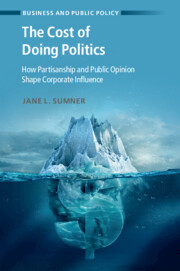
The Cost of Doing Politics
How Partisanship and Public Opinion Shape Corporate Influence
Sorozatcím: Business and Public Policy;
-
10% KEDVEZMÉNY?
- A kedvezmény csak az 'Értesítés a kedvenc témákról' hírlevelünk címzettjeinek rendeléseire érvényes.
- Kiadói listaár GBP 25.99
-
12 416 Ft (11 825 Ft + 5% áfa)
Az ár azért becsült, mert a rendelés pillanatában nem lehet pontosan tudni, hogy a beérkezéskor milyen lesz a forint árfolyama az adott termék eredeti devizájához képest. Ha a forint romlana, kissé többet, ha javulna, kissé kevesebbet kell majd fizetnie.
- Kedvezmény(ek) 10% (cc. 1 242 Ft off)
- Kedvezményes ár 11 175 Ft (10 643 Ft + 5% áfa)
Iratkozzon fel most és részesüljön kedvezőbb árainkból!
Feliratkozom
12 416 Ft

Beszerezhetőség
Becsült beszerzési idő: A Prosperónál jelenleg nincsen raktáron, de a kiadónál igen. Beszerzés kb. 3-5 hét..
A Prosperónál jelenleg nincsen raktáron.
Why don't you give exact delivery time?
A beszerzés időigényét az eddigi tapasztalatokra alapozva adjuk meg. Azért becsült, mert a terméket külföldről hozzuk be, így a kiadó kiszolgálásának pillanatnyi gyorsaságától is függ. A megadottnál gyorsabb és lassabb szállítás is elképzelhető, de mindent megteszünk, hogy Ön a lehető leghamarabb jusson hozzá a termékhez.
A termék adatai:
- Kiadó Cambridge University Press
- Megjelenés dátuma 2024. március 21.
- ISBN 9781009124584
- Kötéstípus Puhakötés
- Terjedelem260 oldal
- Méret 228x151x14 mm
- Súly 390 g
- Nyelv angol 547
Kategóriák
Rövid leírás:
Reveals how and why corporate political influence remains largely invisible to the public eye.
TöbbHosszú leírás:
Using quantitative and qualitative evidence, Sumner shows how consumer boycotts can work to dissuade companies from donating money to politicians, but may also encourage companies to attempt influence by largely invisible means. Boycotts do not work as many people expect - by threatening sales. Instead, Sumner shows how boycotts are less a statement of consumer behaviour than a way for people to signal their political inclinations, and they primarily hurt companies by tarnishing their reputation. Political influence is about building relationships, which means that companies have many more options for influence than just PAC contributions and formal lobbying. With these options available, companies can decide how to influence politics when they need to, and the tarnish of boycotts to a company's image can push some businesses to pursue options that are less noticeable to the public.
'This book shows how the ever-present 'threat of public backlash' induces firms to obscure some lobbying-type actions aimed at political influence, to avoid some others altogether, and conversely intentionally to publicize a few others or at least undertake them in plain daylight without effort to hide. It convincingly establishes that 'public backlash' against firm political action (influence-seeking) is a form of political speech that strongly influences how, and how much, corporate political influence is exerted. Jane Lawrence Sumner's The Cost of Doing Politics is outstanding, and important, scholarship on the powerful role of popular action in mitigating problematic firm lobbying and government influence.' Robert J. Franzese, Jr, Department of Political Science, The University of Michigan, Ann Arbor
Tartalomjegyzék:
1. Introduction; 2. Where does political influence come from?; 3. How does public opinion shape corporate political advocacy?; 4. Why does the public care about corporate political influence?; 5. Why do companies care about public opinion?; 6. Do companies try to avoid public backlash?; 7. So what and now what? Summaries and concluding thoughts; Bibliography; Appendix A: Interview methods; Appendix B: Chapter 4 study methodology and full results; Appendix C: Chapter 5 robustness checks; Appendix D: Chapter 6 robustness checks; Index.
Több



